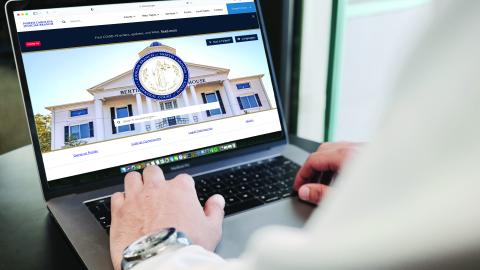N.C. Administrative Office of the Courts Updates and Adopts Forms to Facilitate Remote Criminal Proceedings
Article contents

The North Carolina Administrative Office of the Courts (NCAOC) has announced it has adopted new and revised court forms to facilitate the trial courts’ ability to conduct criminal proceedings by audio and video transmission (AVT).
In S.L. 2021-47, enacted June 2021, the North Carolina General Assembly enacted N.C.G.S. 7A-49.6, which permits courts to conduct judicial proceedings via AVT. For criminal proceedings, N.C.G.S. 7A-49.6(e) requires that when a criminal defendant’s right to confront witnesses or to be present applies to a proceeding, the court may conduct the proceeding by AVT upon obtaining from the defendant a waiver of those rights. The new and revised forms from the NCAOC facilitate that waiver process.
- A new form (AOC-CR-411) has been adopted to memorialize a defendant’s waiver and consent to an AVT appearance. The new AOC-CR-411 was adopted to replace a temporary form for this purpose developed jointly by the NCAOC and faculty of the UNC School of Government in 2020 for remote proceedings conducted during the COVID-19 pandemic.
- To accompany the new form, a new colloquy has been developed for presiding officials to use in obtaining a defendant’s waiver for an AVT proceeding. Although not a “form” in the traditional sense, the new colloquy has been assigned the form number of AOC-CR-412 for ease of reference and to locate it with the waiver form on the NCAOC’s Forms page on our website.
- The NCAOC’s Transcript of Plea (AOC-CR-300) has been updated to include an abbreviated format of the waiver for defendants represented by counsel. Counsel can advise their clients of their rights to presence and confrontation, alleviating the need for a full colloquy between the court and defendant and execution of the AOC-CR-411 for the entry of a plea.
These updates resulted from The Chief Justice's Remote Proceedings Task Force that was formed to improve efficiency and reduce the liability and costs associated with transporting individuals from detention facilities to courthouses for court proceedings. The Task Force is co-chaired by Cabarrus County Senior Resident Superior Court Judge Marty McGee and Eddie Caldwell, executive vice president and general counsel of the N.C. Sheriff’s Association. “The COVID-19 pandemic presented numerous challenges to courts across the country,” said Judge McGee. “One emerging trend is the prevalence of remote hearings conducted via audio video transmission.”